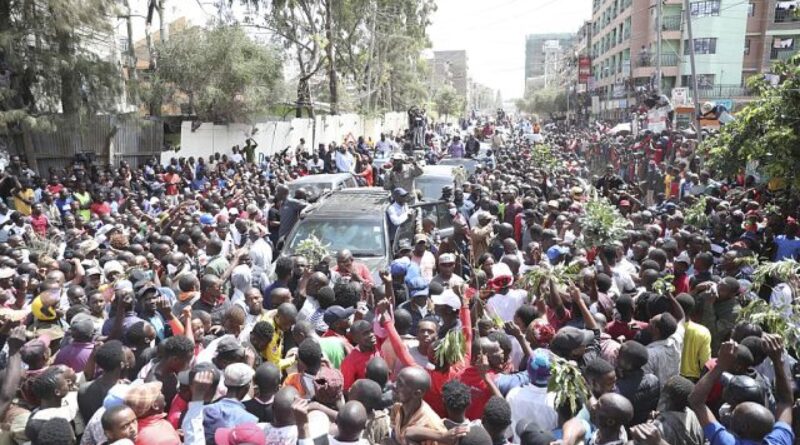Kenya: Raila Odinga leads third day of anti govt protests
Sporadic violence broke out in Kenya on Thursday, the third day of opposition demonstrations to protest at the government and the high cost of living.
Security was tight, with police in riot gear patrolling the capital Nairobi after fierce clashes had erupted during similar protests on Monday.
On Thursday, dozens of people in the congested Nairobi neighbourhoods of Mathare and Kibera engaged police in running battles, throwing rocks and burning tyres while officers responded with tear gas.
In opposition leader Raila Odinga’s lakeside bastions of Kisumu and Homa Bay in western Kenya, protesters hurled rocks at police and lit bonfires in the middle of the road.
Odinga has called for protests every Monday and Thursday, accusing President William Ruto of stealing last year’s election and of failing to control the surging cost of living.
“Kenyans must get justice. We will not relent,” Odinga told crowds of cheering supporters, many waving green foliage in a sign of peaceful demonstration.
“The cost of living is rising every day and we are not going to keep quiet. We are telling Ruto that Kenyans are tired,” he said, also calling for constitutional reforms.
The demonstrations — declared illegal by the government — had been much more violent on previous days, with police firing tear gas, water cannon and occasionally live bullets, while looters went on the rampage.
In all, two civilians have been killed and 51 police officers and 85 civilians injured, according to government figures.
The international community and religious leaders have appealed for calm, voicing fears of a repeat of the 2007/08 post-election ethnic fighting that claimed the lives of more than 1,100 people.
In a statement Wednesday, eight foreign embassies, including the US and British missions, called on “all leaders and all Kenyans to maintain peace, show restraint, and work toward a swift resolution for the common good of Kenya”.
The African Union also appealed Tuesday for calm and political dialogue to end the chaos.
Ruto, who was back in Kenya after a trip to Germany and Belgium, had warned his compatriots earlier this week that they must abide by the rule of law.
– ‘Portrait of anarchy’ –
On Wednesday, Interior Minister Kithure Kindiki said anyone inciting public disorder or disturbing the peace would face prosecution.
“The current portrait of anarchy, and the unfolding criminal madness must stop,” he said in a statement, warning that the situation risked the nation’s stability.
Many Kenyans are struggling to put food on the table, battling high prices for basic goods as well as a plunging local currency and record drought that has left millions hungry.
Inflation was running at 9.2 percent in February with food inflation at 13.3 percent.
The Central Bank of Kenya on Wednesday raised its benchmark lending rate by 75 basis points to 9.5 percent, signalling costlier loans for Kenyans.
During the campaign for the August election, Ruto portrayed himself as champion of the downtrodden and vowed to improve the lot of ordinary Kenyans.
But he has since removed subsidies for fuel and maize flour — a dietary staple, and last week Kenya’s energy regulatory body announced a hike in electricity prices.

